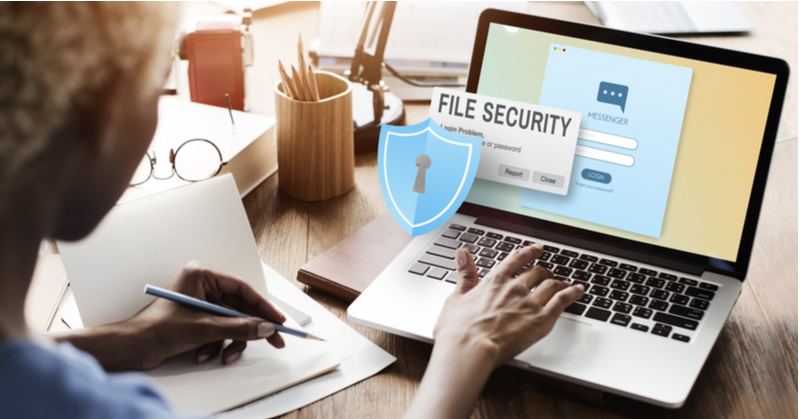Security is vital for any business but especially for accounting, bookkeeping and tax preparation firms, which deal with some of the most sensitive kinds of data. A security breach will not only harm the accounting business itself but could expose its clients to serious risks.
When you need to exchange files with clients to carry out your work, it’s critical to have a thorough approach to file sharing security that leaves nothing to chance and protects sensitive information. Below are 4 best practices for file sharing security that will help prevent unauthorized parties from gaining access to any of your or your clients’ digital communication.
Use a secure file platform
Sending files directly to another party – whether it be via email, a messenger app, or even Bluetooth transfer – may seem like an easy option. You and your clients are used to these tools and probably use them every day for other kinds of business correspondence, so why not also use them to exchange files?
The answer: security.
Many of these popular communication tools – including email – are designed for convenience and usability first, not security. For a simple example, think about Apple’s iMessage, a staple on millions of smartphones, tablets and laptops around the world. Every day, hundreds of millions of people around the world use Apple’s messaging protocol to share text messages, images, and files.
But last year, tech outlets reported widely on a serious security flaw that allowed hackers to easily break into a victim’s iMessages, even if they didn’t click on a spam link or download a compromised file onto their phone. Apple eventually fixed the issue, but it’s almost guaranteed that hackers will continue trying to find ways to exploit popular tools to steal data.
For accounting firms sending and receiving sensitive client files, it’s important to use an extra layer of security beyond everyday protocols that are capable of being hacked. Of course, some secure file portals are so complicated and difficult to use that clients will be turned off by them. An accounting firm must strike a good balance by finding a portal or some other type of secure file sharing that works well yet is user-friendly enough for clients to navigate.
The best solution is one that provides the convenience of tools a client is already familiar with – like email – with the encryption security provided by a secure portal. If a secure file-sharing platform takes someone too far away from the workflow they’re used to, it probably won’t get used.
Encrypt sensitive files
Despite your best efforts to use the secure methods of sharing files outlined above, it’s still wise to use an encryption protocol for important files like a client’s tax documents and forms. Encrypting a file puts it behind special protection that can only be accessed with a code, sometimes known as a key. Anyone looking to open the file will need the key if they want to bypass the encryption.
Encryption is a great safeguard to prevent hackers from accessing a file even if they manage to intercept it during transmission. Additionally, encryption protects against the human error factor – if a client or someone on your team accidentally sends a sensitive file to the wrong person, encryption will lessen the chances that the recipient can access the data.
Teach employees and clients good habits
While creating a strong layer of security to prevent malicious attacks is important, it’s often the human factor that leads to the most serious breakdowns in security. In a wide-ranging study by Verizon that examined 80,000 data breach incidents from 2020, 85% involved some sort of human error or deception. Tactics used by hackers today are more malicious than ever – many will fool victims into divulging sensitive information by posing as a legitimate institution like a bank or insurance company.
It’s much more likely for your firm to fall victim to this kind of mistake than it is for a malicious party to infiltrate your network and steal sensitive data without anyone realizing it. That’s why it’s important to ensure that everyone who will be handling confidential files gets trained on proper digital security habits. This is true even if they are only involved with the sending and receiving of the files and don’t perform any of the work involved to create them.
Modern cybersecurity training should include important concepts like:
- Password hygiene, best practices for creating unique and hard-to-guess passwords.
- Two-factor authentication, enabling the use of a mobile device for identity verification
- Identifying common phishing techniques such as email or text message links intended to infect a victim’s phone or computer
The more training you can offer your team on security, the less likely they are to make a mistake that leads to a data breach or compromises your firm’s sensitive data. Obviously, there are limitations on how much of this guidance you can offer to clients, but you should always be willing to assist with file security concerns – especially if they ask for help or seem like they might need it.
Keep all software updated
Our last tip is straightforward but important: you must keep all of the digital tools your business uses up to date. This includes everything from office computers to your personal smartphone that you use to check email every once in a while. If a device is used to access, receive or transmit sensitive information, it should be running the latest version of all pertinent applications – from operating systems and email clients to accounting practice management software.
To make this step easy, you can batch all needed updates together and perform them at the same time. For example, you might schedule all computers and other devices to be updated on the last day of every month.
Conclusion: file-sharing security is an ongoing effort
All businesses are susceptible to digital attacks, but accounting firms are especially popular targets for hackers because of the nature of the data they work with. Accounting firms of all sizes need to actively protect themselves from malicious cybercriminals, while also helping their team and clients practice good digital security habits. With the right software and effective internal policies and security habits, you can keep your firm’s data – including sensitive client information – safe and protected.
Interested in learning more about data security? Read this 6-part series on building a data security plan for your practice.
.png?width=150&height=63&name=TWRlogo-regmark_blueblack%20(1).png)
.png)










Do you have questions about this article? Email us and let us know > info@woodard.com
Comments: